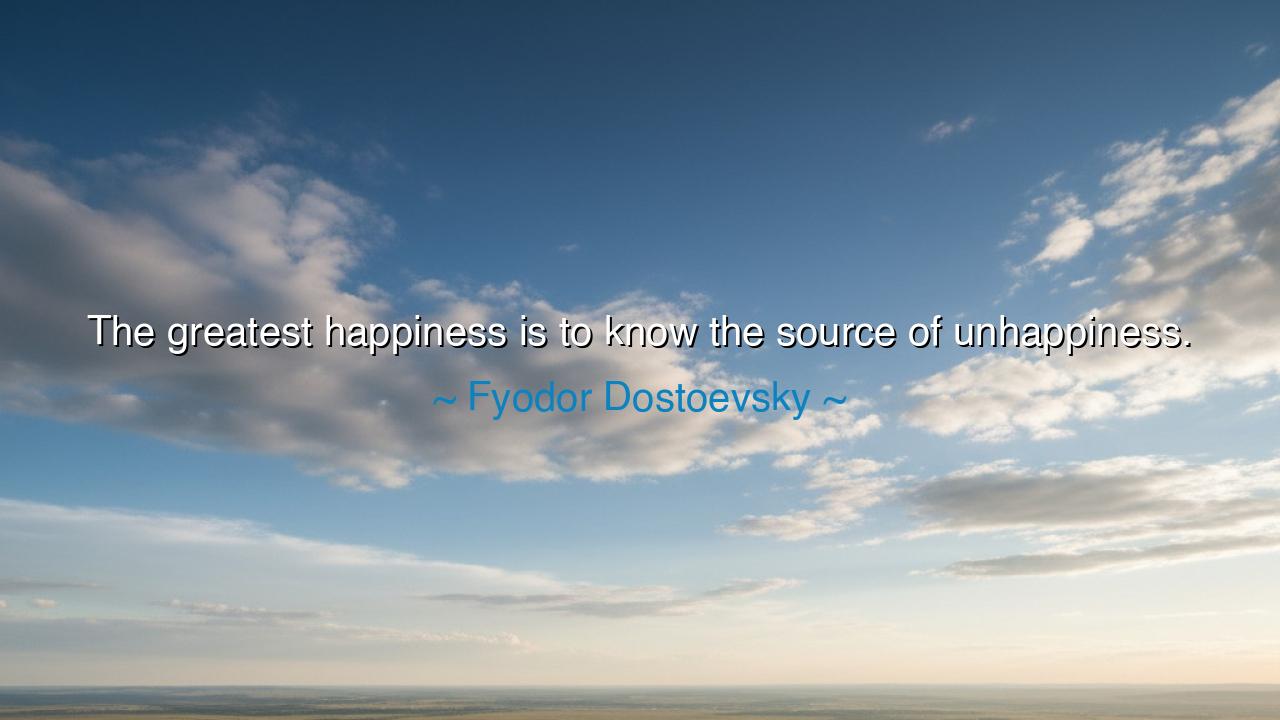
The greatest happiness is to know the source of unhappiness.






“The greatest happiness is to know the source of unhappiness.” — Thus wrote Fyodor Dostoevsky, the seer of the soul’s abyss, the man who walked through darkness and returned carrying the flame of truth. His words rise like a chant from the depths of suffering, a song sung not by the untested or the innocent, but by one who has endured the weight of despair and found meaning within it. To understand this saying is to understand the strange alchemy of the spirit — that wisdom is born from pain, and that joy, the truest joy, is not the absence of sorrow but the understanding of it.
For Dostoevsky, life was not a smooth path but a battlefield of the heart. He knew that ignorance of suffering is not peace — it is blindness. Many souls, frightened of pain, cover their wounds with distractions, riches, or false laughter. Yet the wound festers beneath, unnamed and unhealed. Only the one who dares to look inward, to trace the source of unhappiness to its roots, can be freed. To know why one suffers is to reclaim power over the suffering. It is to turn the darkness from an enemy into a teacher, and from that knowing arises a deeper, steadier kind of happiness — not light and fleeting, but calm and enduring.
This truth is not new. The ancients, too, knew it well. The philosophers of old taught, “Know thyself,” for in self-knowledge lies deliverance. The Buddha, too, spoke of understanding the origin of suffering — not to escape the world, but to be free from its illusions. Dostoevsky’s wisdom flows from this same eternal spring. He understood that unhappiness is not the punishment of life, but its invitation — a call to awaken. When a man ceases to run from his pain and instead listens to it, he discovers that pain speaks a sacred language. It reveals where the heart is chained, where the soul is afraid, where the truth has been forgotten. And in that revelation, there is liberation.
Think of Viktor Frankl, the prisoner of Auschwitz who found meaning even among ashes. Surrounded by suffering beyond measure, he observed that those who survived were not the strongest, but those who could give their pain a purpose. Frankl understood the source of his unhappiness — not merely hunger or fear, but the loss of meaning. And so he transformed it. He taught that man’s last freedom is to choose his attitude toward suffering. In that choice, even amid torment, he found a kind of happiness — not comfort, but dignity. His life proved Dostoevsky’s truth: that the greatest joy lies not in fleeing pain, but in understanding it.
Yet few have the courage to look inward. Most of us flee from our own shadows, blaming the world for wounds that were planted within. We drown our unrest in noise and busyness, and so the source of our unhappiness remains hidden. But the wise do not run. They sit in silence before their sorrow and ask: “What is this pain trying to show me?” For every tear has a message, every sorrow a lesson. To know this is to begin the long work of healing — and that work, though painful, is sacred. Through it, the heart is refined as gold through fire.
This is what Dostoevsky meant: true happiness is not found by avoiding suffering, but by understanding it. The one who sees clearly why he weeps has already begun to dry his tears. The one who names his darkness is already walking toward the dawn. To know the source of your unhappiness is to cease being its victim — it is to become its master. You cannot cure what you will not face; you cannot heal what you will not name. The light that dispels the night must come from within.
And so, my listener, the lesson is this: when sorrow visits you, do not cast it out at once. Sit with it. Ask it where it comes from. Seek the hidden truth behind its shadow. You will find that pain, once understood, loses its poison and becomes a source of strength. Face your unhappiness as a warrior faces an ancient beast — not with fear, but with the calm of one who knows that victory is not escape, but comprehension.
For when you know the source of your unhappiness, you hold the key to peace. The chains that once bound you fall away, and in their place grows a quiet joy — not the joy of laughter, but the joy of wisdom. This is the greatest happiness Dostoevsky spoke of: the serenity that blooms only in the heart that has dared to understand itself.






AAdministratorAdministrator
Welcome, honored guests. Please leave a comment, we will respond soon